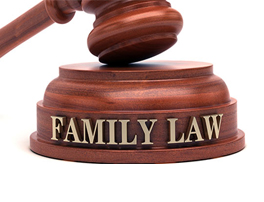
When married couples go through a divorce, one of the biggest issues that needs to be sorted out is the custody of their children. In Illinois, the majority of child custody disputes end with the courts assigning the divorcing parents joint custody. The state of Illinois prefers joint custody because these arrangements are typically in the child’s best interests. This means that if you want sole custody of your child following a divorce, it will take some extra effort. Parents are only granted sole custody of their children in Illinois if the court truly believes that it is best for your children to be in the sole custody of one parent.
The process of gaining full custody of your children is a stressful process. You will need to submit a petition to the court as well as a Child Custody Affidavit to start the process. You will also need to prove to the court that your ex-spouse is an unfit parent and that you are fully capable of handling the responsibilities that come with sole custody. In this guide, we will cover the steps you need to take to obtain sole custody of your children to help you navigate the process. Knowing what to expect when working towards sole custody will help make the process a little easier and less stressful. It will also help immensely to work with a trusted family law attorney to help you through your child custody dispute.
Definition of Child Custody in Illinois
 Joint custody and sole custody are the two options parents have within the state of Illinois. The courts generally prefer to grant joint custody because it is beneficial for the children to have healthy relationships with both parents. In Illinois, being granted custody means that you have the authority to make decisions for your child concerning education, health care, and religion. There is also no distinction between legal custody and physical custody, as the state of Illinois just grants “custody” which is the right to make decisions.
Joint custody and sole custody are the two options parents have within the state of Illinois. The courts generally prefer to grant joint custody because it is beneficial for the children to have healthy relationships with both parents. In Illinois, being granted custody means that you have the authority to make decisions for your child concerning education, health care, and religion. There is also no distinction between legal custody and physical custody, as the state of Illinois just grants “custody” which is the right to make decisions.
Obtaining sole custody gives you alone the right to make decisions for your child while joint custody means that the other parent must be involved with these decisions. In cases where sole custody is granted, the other parent is often allowed visitation and is still responsible for child support payments. You may prevent the other parent from having unsupervised visitation if you can prove that this puts the mental, physical, or emotional health of your child at risk.
Filing for Sole Custody
Filing for sole custody of your children starts with petitioning the court for sole custody which Illinois allows you to do within your divorce petition. In addition, a Child Custody Affidavit, also known as a Uniform Child Custody Jurisdictional Enforcement Act Declaration, must be submitted to the court. This document informs the court of your child’s current living situation, including where they live and with whom, and should include details of other child custody cases past or present that involve your child.
After submitting these forms, your spouse needs to be informed of your petition for sole custody. The sheriff will serve your spouse the appropriate documentation, including a summons to appear in court. The spouse can contest your petition for sole custody within 30 days which will take the matter to court for a hearing.
Temporary Orders
During the divorce proceeding, you and your spouse can petition for a temporary custody order to make living and decision-making arrangements for your child while the divorce proceeding is ongoing. This order will determine where the child will live and whether one or both parents will be responsible for the decision making. These orders are temporary and are replaced by the permanent custody arrangement at the conclusion of the divorce. When forming the permanent custody arrangement, the courts may incorporate elements of the temporary order if the arrangement is successful. Divorcing couples can also submit a custody arrangement that they have created themselves to the court. The court will approve the custody arrangement if it deems the terms of the arrangement to be in the best interest of the child.
Burden of Proof
As mentioned above, Illinois courts prefer to award joint custody unless one parent is unfit or if both parents cannot make decisions for their child together. The parent petitioning for sole custody must prove that the spouse is unfit to be awarded sole custody by the court. You can submit documentation including bills, exchanged emails, police reports, and other relevant paperwork to help build your case for sole custody. However, your case must be built in good faith. If the court believes that you are trying to alienate your child from the other parent or that you are intentionally being uncooperative to show that you and your spouse cannot work together, there is a good chance you will not get sole custody. It is even possible for the court to award soul custody to your spouse if you do not act in good faith.
The following documentation can help you build your case that the other parent is unfit:
- Employment record: Proving that your spouse cannot hold a job will help your case because this will show that they cannot provide financial support for the child. While this will help you get sole custody, it will not affect the court’s decision regarding that parent’s visitation, or parenting time.
- Poor living conditions: If you can show that your spouse maintains poor living conditions that can threaten the health and safety of your child, this can help your case for sole custody.
- Abuse: Proving emotional, physical, or sexual abuse, or substance abuse, will likely get you full custody.
- Capability: If you can prove that your spouse is not physically or emotionally capable of caring for the child, you are more likely to gain sole custody.
While building a case to show that your spouse is an unfit parent, you must simultaneously build a case to show that you can handle the parental responsibility that comes with sole custody. The following will help you prove that you are capable of handling sole child custody:
- Talk about your child’s best interests: Discuss the habits, schedule, and daily routine of your child throughout the proceedings to show that you are aware of your child’s best interests and willing to work to uphold them.
- Discuss the involvement of the other parent: If you plan on allowing your spouse parenting time with your child, discuss how they will be involved with visitation and decisions. Your willingness to work with your spouse will help your case.
- Talk about specifics: The courts are most interested in the specific details of how you plan to support your children and meet their specific needs. Simply proclaiming your love for your child is not enough.
- Dress formally: Appearing in court in the proper attire will help show that you are responsible enough for sole custody.
- Prepare necessary paperwork: Make sure your paperwork and supporting arguments and evidence are in order before your court date. This organization will help you better present your case and show your level of responsibility.
- Don’t attack your spouse: It is very important to base your case on provable facts and to avoid attacking your spouse. Personal attacks will hurt your case for sole custody. Keeping your approach professional will help your case and if the other parent is truly unfit, it will show in court.
Hire a Family Law Attorney for Child Custody Hearings
Sole child custody is difficult to obtain unless there is clear evidence of abuse on the part of the other parent. When courts in Illinois make their decision on child custody, they will not only consider the petition and wishes of the parents, but also the relationship the child has with each parent and sibling, the mental and physical health of the children and parents, the willingness of the parents to help their children have a close relationship with each parent, the child’s adjustment to their home and school, and any history of abuse or domestic violence.
One of the best ways to improve your chances of being awarded sole custody of your child is to enlist the help of a family law attorney that is experienced in dealing with child custody disputes. Our attorneys at Allen Gabe Law, P.C. have years of experience dealing with child custody disputes and we will always work with the best interests of your children in mind. We will help make sure that you submit the proper documentation to petition for sole custody and we will also offer you guidance to help you build your case.







